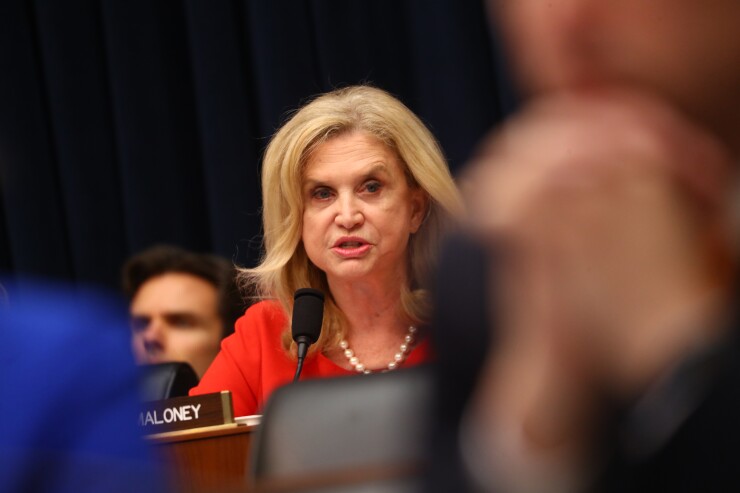WASHINGTON — The good news for banks is Congress appears poised to enact anti-money-laundering reforms favorable to the industry. The bad news is the reform perhaps most sought by financial institutions has lost popularity on Capitol Hill.
The House Financial Services Committee plans to start debate this week on two standalone AML-related bills. One would require new companies to identify "beneficial owners," taking the pressure off banks to collect such information from customers. The second would strengthen information-sharing between law enforcement and banks that invest in AML compliance.
But a proposal desired by banks to raise thresholds for banks reporting suspicious transactions has fallen off the committee's radar. The idea of higher thresholds for currency transaction reports and suspicious activity reports — which was considered as part of a more sweeping AML reform package — is opposed by law enforcement. Lawmakers for now appear focused on advancing less controversial piecemeal items.
“It’s probably right to say that it would be easier to get beneficial ownership through without the CTR and SAR thresholds,” said Diego Zuluaga, a policy analyst at the Cato Institute’s Center for Monetary and Financial Alternatives.
Lawmakers could return to a broader AML package, which could include changes to the transaction thresholds. But for now both chambers in Congress are more focused on beneficial ownership.
Banks support a beneficial owner requirement, since it would absolve them of regulatory requirements to identify owners behind shell companies. The House bill sponsored by Rep. Carolyn Maloney, D-N.Y., which the committee could pass as early as Thursday, would require companies to disclose their true owners at time of incorporation.

Meanwhile, Sen. Mark Warner, D-Va., who has negotiated an AML reform package with three other Senate Banking Committee members, has indicated that whatever agreement they will come up with should include a beneficial ownership provision. He has already circulated a reform draft with some regulators, a spokesperson told American Banker.
The other bill scheduled for the House Financial Services Committee markup is sponsored by Rep. Emanuel Cleaver, D-Mo., and it is intended to help banks better direct their resources at money-laundering threats. But legislation introduced this Congress to triple the CTR threshold to $30,000 and double the SAR threshold to $10,000 is not on the agenda.
The financial services industry has been firmly behind the beneficial ownership bill.
The Maloney legislation "strikes the right balance between imposing minimal requirements on small businesses while providing important information to law enforcement and financial institutions performing due diligence,” several financial industry groups said in a letter to the House committee.
But even with their support for Maloney’s bill, industry representatives would still like to see the thresholds raised.
“We would also support efforts to address the outdated SAR and CTR thresholds that have been in place for over 50 years,” said James Ballentine, executive vice president of congressional relations and political affairs for the American Bankers Association. “Law enforcement has consistently expressed concerns about raising the thresholds and we expect that to continue.”
Reforming the current anti-money-laundering framework was largely viewed as an area where the new divided Congress could potentially come to a consensus.
But it became apparent in November that bankers’ hopes of being relieved from the CTR and SAR reporting burdens were not supported by law enforcement. Kenneth Blanco, the director of the Financial Crimes Enforcement Network, warned the Senate Banking Committee that fewer reports from banks would mean the loss of valuable data in the fight against bad actors.
“With respect to thresholds, we have identified some initial concerns, especially from our law enforcement partners, that significant increases in the respective thresholds could reduce the amount of valuable financial intelligence available to Treasury, law enforcement, and other key domestic and international partners,” Blanco said.
Banks and Republicans in Congress are still hopeful they can move the needle on raising the thresholds, but so far no Democrats have signed on to that proposal, which is being spearheaded by Rep. Barry Loudermilk, R-Ga.
“We’re pressing for several pieces and one of our top priorities is getting those thresholds increased for the currency transaction report and the SARs. … You are getting tens of thousands of those reports because the thresholds and amount of cash hasn’t been changed,” said Paul Merski, group executive vice president for congressional relations and strategy at the Independent Community Bankers of America.
Merski added that he hopes it is possible for the committee to add an amendment to an AML reform bill that would raise the reporting thresholds.
“It shouldn’t be a huge lift and something that we’d like to see included in this attempt to address BSA and AML,” he said, referring to the Bank Secrecy Act.
A beneficial ownership bill is also not a slam dunk since some Republicans are concerned it will impose burdens on small businesses. That could prove to be a roadblock in the GOP-controlled Senate.
Rep. Patrick McHenry, R-N.C., the House committee's ranking member, said in a letter to Blanco Tuesday that he would like more details on how beneficial ownership would help law enforcement.
“The Financial Services Committee sits on the brink of considering significant legislation that will impose new burdens on every small business across the nation,” McHenry said.
In an interview, Maloney said she disagreed with the notion that it would impose undue burdens on small businesses. She added that Rep. Blaine Luetkemeyer, R-Mo., a subcommittee ranking member, is committed to supporting the bill in committee, but might still want to “fine-tune” it before it hits the full House floor.
“It’s just, once a year, filling out one form that says who is the beneficial owner,” Maloney said. “We simplified it. You fill it out once a year, not two or three times a year, just once a year and I don’t see what the burden is.”





